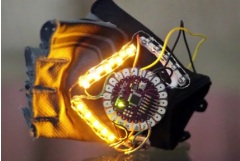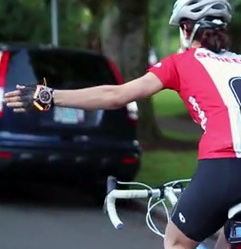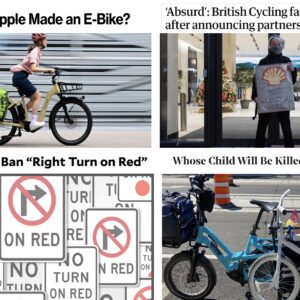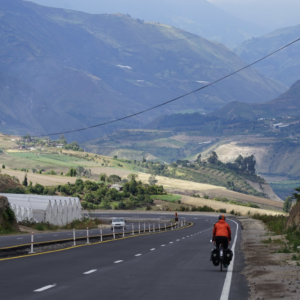
One glaring way that bicycles lack the same presence on the roadway as cars is in their lack of adequate lighting systems. In particular, bicycles don’t come equipped with one of the most basic and important lights that cars have — turn signals.
Portlander Jack O’Neal hopes to change that.
O’Neal, 32, is an Afghanistan war veteran who is currently attending Portland State University to get a degree in mechanical engineering. He has developed a cycling accessory called “YouTurn,” which fits on your hand and automatically displays a large yellow arrow in the direction you want to turn. The device is motion-activated (it uses technology from smartphones) and works when the rider puts out their hand to signal a turn.

Fed up with he saw as a “void in the cycle light industry,” O’Neal says his invention has potential because it does more than a standard bike light and it’s less bulky and cumbersome than other bike turn signal lights that have come on the market.
O’Neal has developed a working prototype (see it in the video below), and now he’s looking for help to finish the design and engineering required to bring the product to market. He has launched a Kickstarter campaign in hopes of raising $50,000 by September 24th.
Check out his Kickstarter page for more info and to back this project.







Thanks for reading.
BikePortland has served this community with independent community journalism since 2005. We rely on subscriptions from readers like you to survive. Your financial support is vital in keeping this valuable resource alive and well.
Please subscribe today to strengthen and expand our work.
Have to admit that is pretty damn cool!
I wonder if that will help put an end to the curious (and auto-derived) habit of raising your left hand to indicate a right turn?
9watts, nope. It looks like it will only reinforce it. His device is a one-handed device that determine whether your had is out to your left or raised upward.
unless one were to buy two of them… or is there a reason that wouldn’t work?
Quite the contrary—it’s a one handed device. Check out the video!
one thing i like: it will force people to perform the signals properly. instead of a hand kinda-sorta stuck out in an approximation of a hand signal, they’ll actually need to put their hand straight out or up. this isn’t the final answer (i think i’d prefer bike-mounted more) but it’s a great idea, a great step forward. it’s the kind of innovation we need more of: a better device that leads to improved rider behavior.
how about a stop signal too? probably wouldn’t be too tough to add. That’s what i worry about most. of course, it’d probably be tough to tell the difference from a stop signal and a blinking red tail light. just a thought.
For that you could have an extra-bright red light that is only triggered when you squeeze the brake levers.
you could have it trigger when you point your hand downward, i.e. the stop signal you are supposed to already be using.
I tend to brake with my left hand, using my right to signal a stop.
http://www.sheldonbrown.com/brakturn.html
There is a braking light system available: http://www.peterwhitecycles.com/taillights.asp#diwa
I’m not sure I’m on board with a device fitted to the rider’s hand, for two reasons.
First, it doesn’t address the basic problem with hand signals for bikers, which is that it’s dangerous to take your hands off the handlebars while making a turn, especially in a busy intersection. I think this is the reason why bikers don’t signal more often.
The second issue that hand signals have and signal lights don’t is that the lights stay on until the turn is completed. A hand signal relies on other road users seeing the rider’s signal at the time it’s made. So for instance, if you’re in a left turn lane waiting for the signal to change, you may have indicated a left turn when you first arrived, but a car that just pulled up behind you probably didn’t see it.
I think eventually lighted turn signals will be a common, if not required, accessory for urban biking. But they’ll need to solve the two issues I mentioned.
I’m not that hot on this solution.
-John
– Not on the front and back of the hand. When you turn in a car there are several other perspectives of people that need to see your hand.
It would be cheaper/more reliable just to have rugged lights attached to the end of handlebars.
Clever though!
There’s a really cool backpack that performs nearly every traffic function – http://www.toxel.com/tech/2010/09/25/cycling-backpack-shows-turn-signals/ .
But the glove seems to be a much more accessible and affordable solution to the issue.
I like this product.
Regarding hand signals: In the Oregon Driver’s Manual, there is a section on signaling– they have a nice graphic showing how to properly do hand signals.
http://www.odot.state.or.us/forms/dmv/37.pdf (At the top of the page.)
Since this is the method taught to drivers, shouldn’t people riding bikes use the same method? Why introduce confusion on the roadway?
Plenty of drivers don’t seem to know the hand signals – I think the idea with this and other lighting schemes is to reduce confusion by using a more auto-like lighting approach to signals.
And even more don’t know to use the turn signals on their cars properly…or at all. But I suppose that’s another article….
“Why introduce confusion on the roadway?”
I guess it depends on your perspective–what seems more confusing.
Before cars in the US were equipped with turn signals, our forefolk developed those hand signals you find in the driver’s manual. The reason for using the left hand (in the US)–right in UK–is that cars are too wide to see what you do while sitting in one with your other hand. Bikes don’t have that problem, and neither do cars-with-turn-signals.
I’m not a car, I’m riding a bike. While I don’t like taking my hands off the handlebars right before a turn either, sticking the right hand out to indicate a right turn makes infinitely more sense to me. The rest of the world uses this convention–and it is not unheard of in the US. See
http://en.wikipedia.org/wiki/Hand_signals
“Right turn
UK, Germany, Ireland, Italy, Croatia, Russia, Australia, US and Canada (see below)
Extend right arm straight out in the direction of the turn, parallel to the road.
US and Canada, (optional)
Extend your left upper-arm out to the left, parallel to the road and angle your forearm vertically upward. This follows automotive practice.”
Are you implying drivers actually read driving manuals??
or that the DMV adequately tests drivers. they give drivers licenses out like halloween candy.
Hand signal? ROTFLMAO!
Yeah, sure. Try volunteering to do some bike counts fer PBOT this summer, for a little perspective.
You may observe that hand signal incidence is even rarer than compliance with traffic controls (stop signs & lights, lane paint, travel direction, etc.). Most riders can’t be bothered to raise their arm to signal (it’s hardly a matter of safety – if you can’t get a hand off the bars in most riding conditions, you may wanna add another wheel, Grandpa). This is the case for both solo riders and those coursing along in the stringy commuting peloton.
Since the number of in-motion hand-held cell phone users is approaching the number of riders who toss off even a half-intelligible hand signal, I don’t think the problem is using hands to signal: it’s using brains and courtesy when riding (yes, I see evasive actions taken by bicyclists or motorists precipitated by riders’ maneuvers during every bike count session).
As fer the gadget? I love gadgets. I agree that signals located on the bike can be confused with “see-me” strobes and get lost in the narrow reference-width of a bicycle and that hand signaling is superior ’cause of that.
Good luck, Mr. O’Neal. Ya might wanna hurry up and market yer idea to Portland Design Works or someone else local before somebody reading this blog on Taiwain knocks off yer concept and starts fabbing it in Shenzhen next month. If ya got the chops to create this, I’m sure you have other cool stuff yearning to be set free…
Bike snob agrees:
http://bikesnobnyc.blogspot.com/2011/07/help-me-help-you-all-you-haters-pull-my.html
Jene-Paul:
I am not, in fact, a grandfather, but my vision for the future of biking in Portland includes seniors as well as lots of people of different physical abilities.
It’s also one that’s reality-based, so we recognize and accept the evident fact that one hand on the handlebars is less safe than two.
Perhaps a city in which the only people on bikes are bike jocks would be a better fit for you? Smug griping about those without your physical prowess would probably go over a little better there.
-John
Ah. Well, I will be a “senior” later this year, and hopefully, if my newly married daughter can figure out how it works, a grandpa not too far in the future. To think that anyone would mistake me for a “bike jock” is to laugh!
I am as inclusive about bicycling as anyone but my point in the sentence you seem to be responding to was about “abled” bicyclists operating without the use of hand signals (although still able to hold a cell phone). Sorry if my crack distracted from that intent.
That the ORS/RCW requires the use of hand signals by bicyclists is no different from its requirement that electric turn signals must be used on motor vehicles. Riding a bike on a public roadway entails a responsibility to perform specified tasks as established by representatives we elect to make laws for us, as opposed to just being free to ride around in a personal bubble of whimsy. This isn’t ablist prejudice but rather an acknowledgement of the physics of collisions and the sorry absence of mind-reading as a common super-power.
Physically frail or disabled riders will be the first to admit what they cannot do while at the same time pointing to that which allows them to accomplish a specific task by an alternative solution. Machine signaling would be fine if there were demonstrably effective equipment standards which were required by law and taught to all vehicle operators. Until then – just as with cars – people that are frightened of driving in traffic might be happier if they were to avoid doing so instead of adding the rest of us (including both Freds and bike jocks) to their personal dice game.
Can’t we be a little less confrontational in this dialog? We all are the future of biking in Portland.
I actually know a cyclist and regular bike commuter (not in PDX) who actually has lost his left arm. And what about hand cyclists?
Really, I think there are much MUCH bigger problems in the Cycling world than hand signalling.
I am curious, what do they do in Amsterdam? What about Thailand?
I assumed you would have to be fairly young and spry in order to be “ROTFLMAO!” You should be careful with that. You wouldn’t want to blow out a hip or something.
The hips are holding up fine. Toughest thing is finding a walker that folds up small enough to fit in a pannier.
Personally, and only my opinion, I have to admit I think hand signals are just stupid. I very seldom use the traditional ones although in some situations I do Point with me left (or right) arm/hand primarily when taking a lane. I almost never signal an ordinary right turn – and why should I since I am not interfering with other vehicle travel when I turn right. Once I am in a lane to turn left, I figure my position at the left edge of lane clearly indicates I intend to turn left.
Of course I watch closely and make every effort to be aware of cars and make eye contact with drivers and sometimes I make an arm motion to get some ones attention.
In Portland’s hot-blooded bike commuting community, you signal for other cyclists so two people don’t try to occupy the same space.
Maybe it’s a little less of an issue if you’re only sharing the road with cars, but I still think it’s worth making an effort, if only because if we don’t signal, we can’t complain about cars not signaling.
When I am riding in close proximity with other cyclists (which is rare since my riding in PDX is off-peak) I do try to let other riders know where I am going if they are close by including even the akward down pointing left hand to indicate slowing down. I do ride with a mirror so I watch if someone is within a couple of bike lengths.
To Jack O’Neal,
You might want to get your lawyer on this:
Safe Turn Bicycle Indicator
Wrist mounted turn signal light.
http://www.safe-turn.co.uk/
Well it used to be there.
Regardless, someone still owns the patents on this idea, good or bad.
Perhaps they decided the best way to make money off their bicycle turn signal hand device was to wait and sue like a good patent troll.
Good luck Jack O’Neal with 1 “L”.
I would rock a pair of those babies in half a heartbeat. Just point me in the direction when they hit the market!
Really?
In the meantime, you might check these out:
http://www.gloglov.com/USA/index.html
Still made in Oregon, I believe. Same as the Port of Portland cops use at PDX, ‘cept she has a bike-specific version and believe me, they’re durable and work well to get cagers’ attention (testified to by their unsolicited comments on the street), plus – no batteries. They’re sold around town & on her web site, @$22.
Lady who makes/distributes these used to have a store front in downtown Hillsboro; it might make more sense to just sell these at a Saturday Market booth.
Last contact I had, she was in Madras, OR. She has distribution through industrial channels and bike shops, q`Tzal – I don’t think that she needs the Saturday Market anymore.
Similar idea here in an insulated full-finger design. I’ve been using these for winter commuting for a few years and they’re great.
http://www.kincoworkgloves.com/orange-high-visibility/lined-grain-pigskin-glove-w/waterproof-insert-knit-wrist-safety-orange/
Turns out the Glo-Glovs are stretchy enough to pull on over warmer gloves for winter, at least for my hand size. Also got some reflective lineman’s gloves like those ya link to – they’re pretty toasty.
Yes good luck with it. In my mind: The lack of ‘stop’ and visibility from approaching motorists may be the bigger safety issue (thus need) than the safety problem of passing (from the rear) motorists failing to yield to you, unless you have to make many moves from an outside bike lane into a turn pocket across 2 or more lanes on superwide arterials during a long urban commute.
I have bought some of the past attempts at solving this ‘problem’, but most fail to make it past the trial phase. The gloglove is a nice low tech option but not the most comfortable cycling glove (I had one 4 years ago). There was a LED glove I had from the UK about 5 years ago…it was bright but manually turned on and off…it did not last too long in daily use as the electronics/ battery were not too well shielded from sweat/ water and packing. As a kid my 1973 Raleigh Chopper had an aftermarket accessory, a manual left stop right turn battery signal, more fun than actual safety due to visibility in the daytime – but that was the 1970s tech.
I thought it was legal for bikes/motorcycles to use the right hand to signal a right turn (which makes more sense to me and, I think, drivers. Everyone knows what pointing means). Am I wrong?
The ODOT Oregon Bicyclist Manual has illustrations that show right turn signaling with either the bent arm/hand up left arm or an extended right arm, at the rider’s option.
Is this the same Colonel Jack O’Neal from Stargate? If so, awesome! (snicker)
Not sure how I feel about this. I love the entrepreneurial nature of it and the creative use of the technology. I’d prefer a 2-hand solution, though, since I use the “right arm extended” version of the signal.
Once benefit of hand-mounted signal lights is that it gets the signal far off the centerline of the cyclist, making it much clearer that it is in fact a turn signal and not just another flashing light on the back of the bike.
Some debate here over the ‘correct’ method of signaling; in my experience, the ‘correct’ method is the one that communicates your intentions to the people around you well enough to avoid a problem. I use right and left arms individually (usually pointing when turning, and/or opening the palm toward the back and sometimes making a ‘push’ motion to indicate slowing or stopping in the turn – or just plain “back off”), head nodding with eye contact, plain English when in hearing distance but not line of sight, or even expletives come out on occasion. When merging with oncoming drivers I especially seek eye contact and point, and I’ve grown into the habit of a frequent thumbs up after going by.
As far as the gadget goes, I’ve seen the idea before, but this is well implemented even if there are use/design issues (real or perceived). I love innovation, especially relating to bikes, so two thumbs up here (and a donation) – good luck!
Oh yeah, and I won’t tell you what the guy that drove by me on the right while signaling and turning right in the middle of the lane got when I caught up to him at the long red light a few hundred feet away…
I fell off my bike last September due to a severe lapse in coordination–performing a hand signal while rolling over a manhole cover. I hurt myself pretty badly, and since then, I won’t signal if there is any doubt in my mind that I can do it without another mishap, especially if I’m going downhill and having to brake. I would love it if someone would invent a hands-free signal system. In the meantime, I hope and pray my occasional failure to signal doesn’t result in a different kind of accident.
ridiculous
This is a great idea. I actually got heckled by a guy on a bike last week when I did the proper hand signal and he thought I’d done it wrong. When even other people on bikes don’t know the signals, you know you have a problem.
I have a hard enough time with other cyclists not calling their pass or dinging a bell. Is it so hard to say “on your left” or simply “left” if you’re passing someone? If cyclists cant communicate with each other, how are we expected to coexist with motor vehicles!?
Kudos. I had an idea for a simpler mercury switch and red L.E.D. configuration that I never built the planned prototype gloves for.